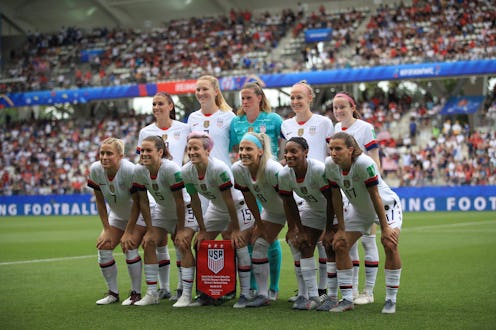
Gender pay equality isn't just a problem for white and blue collar workers — women athletes face similar disparities. As the World Cup continues on, you might be wondering how to help US women's soccer and other sports teams close the gender pay gap. The controversy around pay equality in sports has made a lot of headlines in recent months, and there are multiple ways that you can get involved.
Currently, the U.S. women's soccer team is embroiled in a lawsuit over the fact that the men's soccer team makes significantly more than they do. This is underscored by a report from The Wall Street Journal that indicates the women's team actually generates more revenue than the men's team. In May, the U.S. Soccer Federation responded to the lawsuit by denying gender discrimination allegations, pointing out differences in how the women's and men's teams function, The Journal reported.
But soccer players aren't the only women athletes fighting to close the gender pay gap. After rallying together, the U.S. women's hockey team negotiated its way into bumping up players' salaries three-fold. Team captain Meghan Duggan told the outlet that the process involved hiring lawyers and working with former athletes to generate support.
In the last several years, the WNBA has also received attention for the pay disparity between itself and the men's basketball league. Forbes reports that while men players routinely make several million dollars for playing, the women average less than $80,00 a year.
At the end of the day, a great way to support any team is to go to their games and promote them on social media. But if you're looking for a checklist of specific ways to help women athletes achieve equal pay, there are a few additional ways you can get involved. Just like in gym class, participation is key.
Follow Your Fave Teams On Social Media
Lots of brands rely on their social media metrics to measure their relative popularity. Following your favorite teams (or players!) on social media is an easy way to tell those teams that you care about what they're up to and that you want to stay in the know.
But Also Be An Active Follower
Following teams and players on social media is great, but what's really great is commenting on posts, watching stories, and sharing their content. It will boost their engagement numbers and give them another bargaining chip.
According to Kyle Nelson, MVPIndex's chief marketing officer, brands definitely pay attention to how fans engage with teams on social media. “For properties and the brands that sponsor them, engagement is the best indicator of how much value they are delivering across social,” Nelson said in a story published on MVPIndex, which tracks social media accounts and measures engagement in the sports industry. “It’s not necessarily about how many followers a team or player has or even how often they post, though both are certainly important. Rather, it’s about the quality and authenticity of the content and how deep and often their fans engage with it."
Tune-In To Game Livestreams
Attending games can be time consuming and costly — but don't forget that you can stream a lot of games on television or the internet. Networks and advertisers notice which teams and sports garner the most viewers, so consider setting aside an afternoon or an evening to catch a game or two.
Give Them Kudos Online
You've got your own social media accounts and they can be great real estate for showing support for women athletes. Watching a game? Try tweeting about it. Are you in the stands? Share a pic on Instagram.
Talk To Others About The Gender Pay Gap In Sports
Even talking to people about the lawsuit involving the U.S. women's soccer team can help them understand the need to close the gender pay gap on a broader level. On Equal Pay Day, members of the national soccer team talked to Reuters about the broadscale significance of the lawsuit and how it was crucial to treat women and men athletes equally.
"For us it is really important to really look at the bigger picture of the compensation piece," said midfielder Megan Rapinoe. "I don’t think you can talk about compensation articulately or intelligently until you have a conversation about funding across the board.
"So whether that is youth teams or staffing for each team or promotion and sponsorship, you know, advertising for both teams, I don’t think that that is equal yet."
Get In Touch With Your Lawmakers
Lawmakers can shed a significant deal of light on pay equity in sports and beyond. You can get in touch with your representative to talk about how the issue can be pushed forward to cosign pay equality for women professional athletes.
In some states like California, the issue of closing the pay gap in sports has already won lawmakers' attention and support. If you're also passionate about the subject, you can contact your representative by calling the representative switchboard at 202-225-3121. Once you say which state you're registered in, you'll be put through.
Ask For Transparency
One of the most effective ways to signal support for pay equity in sports is by putting the pressure on organizations to be transparent about their payscale. Knowing how much these women are paid to play compared to their male colleagues is one step forward in understanding — and eventually closing — the disparity in pay for women athletes.
Clearly, the gender wage gap is an issue that burdens women in sports and far beyond. In March, Michele Weldon, a journalist and director of the nonprofit women's equality organization Take the Lead, wrote that women athletes tackling pay inequality in their domains could inspire others to take charge, too.
"Advocate for yourself," Weldon wrote, "just as the women’s soccer team advocated for themselves."
Mehreen Kasana contributed to this report.